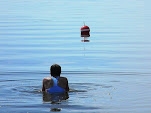I know this book has been out for a while and has won a bunch of awards. But it was new to me. A co-worker read it and we got into a discussion about food and food sources over lunch at The Farmhouse. Great restaurant if you're in downtown Kansas City, by the way.
As a disclaimer, I should note that I am exactly this author's target-audience. I grew up on a farm, eating meat from our animals, dairy straight from the tank or our creamery, and helping my mom with our garden. I raised the baby calves from 0-8 weeks old and helped milk the cows, along with the usual work of pitching pens, throwing hay, and the like. I have a soft spot for all animals and can't bring myself to eat veal. Now, I live in a city and get my food the way most Americans do - from the store.
The first part of the book is all about corn and how it has infiltrated every aspect of our diet. It's interesting information, but it moves a little slow. Once you get past the corn section, it moves much faster.
The author went around the country and visited all types of farms. He spent time on a corn farm in Iowa, at organic farms on the west coast, and a grazing farm in Virginia. He follows our food, as best he can, from the farm through the system. He also makes an attempt at hunting and gathering. Again, I found it humorous since I used to hunt growing up and now have a large garden. I took so much of my upbringing for granted. I remeber when I was little, I thought everyone had cows. Who didn't own a cow?
I'm well aware of the conditions of most commercial farms and I'm well aware of what animal slaughtering processes entail. But it's easy to put that kind of stuff out of your mind when you don't have to deal with it every day. To be perfectly honest, there was a large section of the book that I was almost in tears.
If you've never hunted, gardened, or lived on a farm, you absolutely have to read this book. There is such a disconnect between us and our food. The best information in the book was the website http://www.eatwild.com/. If you're interested in getting your food from local sources, you should check that website out. If you'd rather stay oblivious, then don't read this book. I don't blame you, there is a lot of information that most people would find disturbing. I'm not trying to start a food revolution.
But John and I are starting our own personal food revolution.
As a results of the book, and several previous conversations between John and I, we have decided that we're going to eat only locally raised meat. There are the health reason of lower saturated fats and higher essential fats from grass-fed meat, but for me, there is also the moral aspect of it. I'm not going to preach on what I think your personal moral code should be. But I know that if I were to walk through a commercial laying farm or stock yard that I wouldn't be able to eat that meat. (I might also be inclined to stage a midnight animal rescue) I don't have a problem with locally raised and humanely slaughtered animals. I'm not going completely vegetarian. But I am going to do my best to avoid all commercially-fed meat and eggs.
I don't want people to have to cater to me, so I'm sure I'll still eat mass-produced meat on occasion. I'd don't want to inconvenience others or force my agenda on them. Now if you're a guest in my house, then all's fair in the kitchen. So if you're over for dinner, don't be surprised if what we're serving is mostly vegetarian. Or the most delicious grass-fed beef you've ever eaten.





1 comment:
One of the many reasons that Cafe Kevern is one of my favorite eateries in town! ;) I think I really need to read this book...
Post a Comment